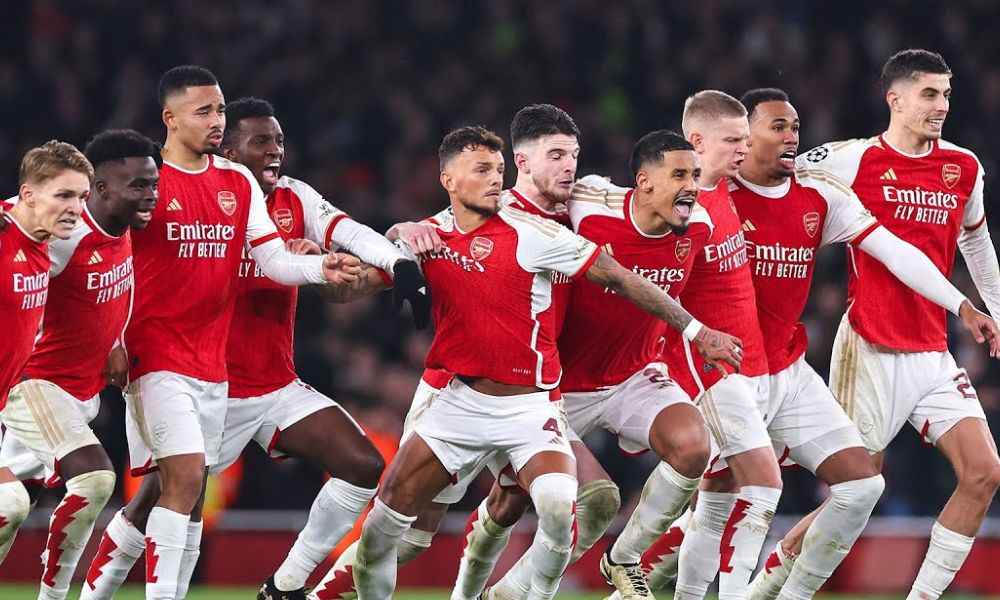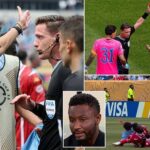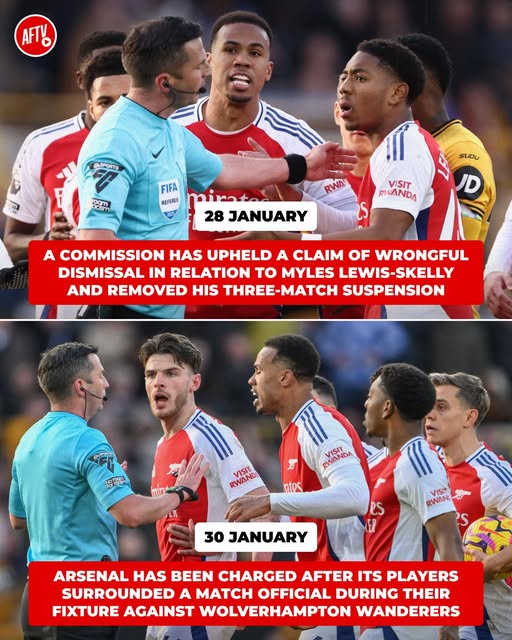ARSENAL-MAN CITY SANCTION
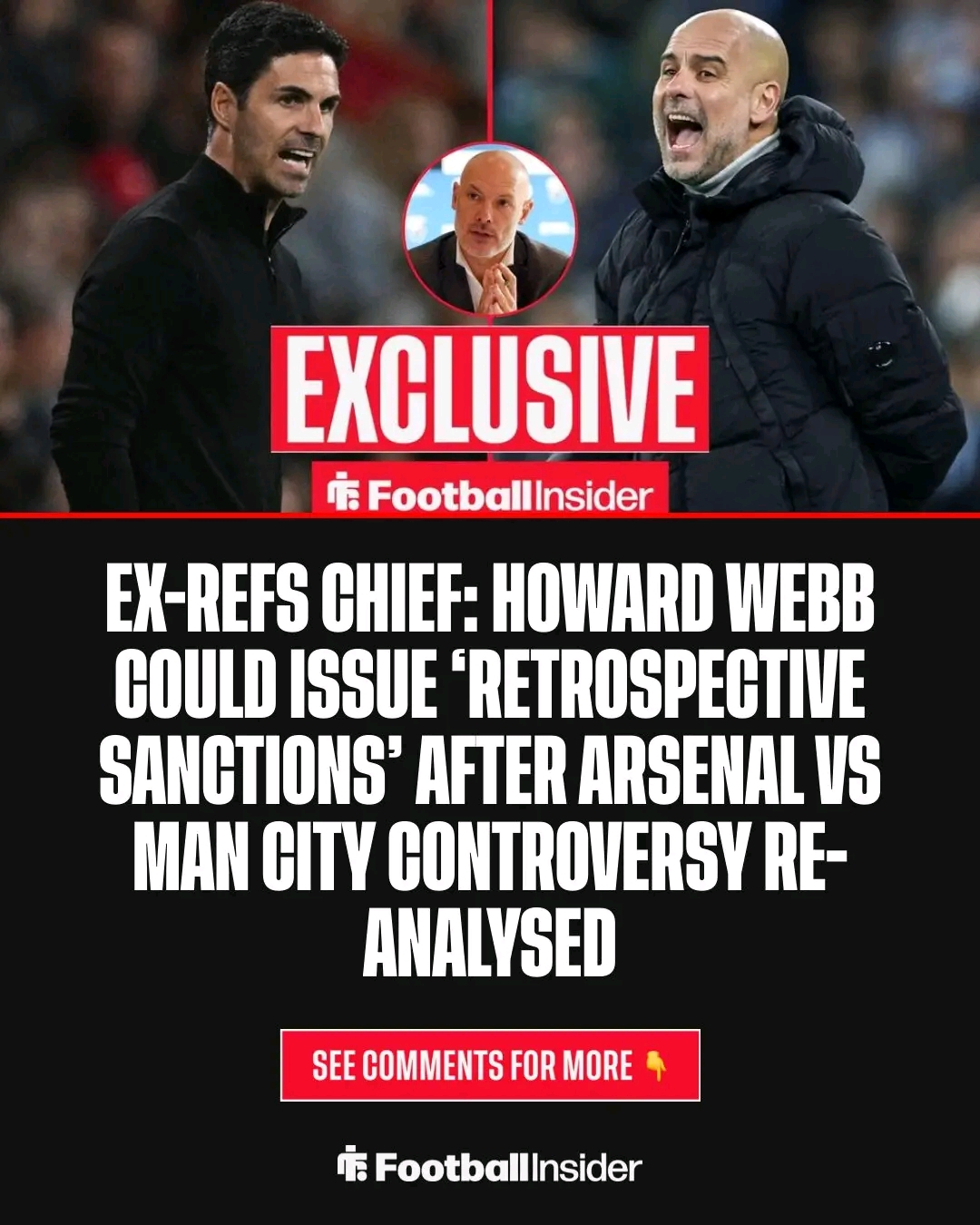
Football has always been a game of passion, of emotions that sometimes spill over and test the limits of discipline. But what happened at the Emirates Stadium in the game between Arsenal and Manchester City has sparked one of the biggest refereeing controversies of the new Premier League season. The referee Stuart Attwell found himself at the center of chaos, the players surrounded him, the managers shouted at the officials, and the crowd demanded justice. What was supposed to be a normal high-intensity clash between two title rivals ended with the entire football world talking about respect for referees, new laws, and the possibility of retrospective punishment from Howard Webb, the man now responsible for keeping order in English football. This game has turned into more than just a 1-1 draw, it has become a story about whether referees have the authority to control elite players and whether the laws introduced this season are already being ignored.
The match itself was always going to be heated. Arsenal and Manchester City are now the two giants of English football, constantly pushing each other to the edge. The rivalry between Mikel Arteta and Pep Guardiola, student and teacher, has added even more drama every time these teams meet. Arteta wants to dethrone Guardiola, he wants Arsenal to be the dominant force, and his team plays with intensity and fire. City, under Guardiola, are a machine, disciplined, ruthless, but also fiery when they feel decisions go against them. Add to this the weight of the title race and you get a game where every decision by the referee matters. That was exactly the problem at the Emirates. Stuart Attwell was the man in the middle, but many believe he lost control of the game.
The new laws this season were supposed to make referees stronger. Only captains were allowed to speak to officials, a rule borrowed from rugby where respect for referees is sacred. But on Sunday, that law looked like a fantasy. Time after time, groups of players rushed towards Attwell whenever a controversial decision was made. It happened in the first half when Bernardo Silva clashed with Leandro Trossard in what looked like a childish pushing incident. Silva was already on a yellow card, and the crowd inside the Emirates roared for a second yellow. Arsenal players stormed towards Attwell, demanding that Silva should walk. City players joined in, protecting their teammate. Instead of isolating the captains, the referee allowed himself to be surrounded, and he gave no further punishment. The fans screamed, the managers shouted, but Attwell just waved play on. It was the first sign that he had lost authority.
Later in the game, Gabriel Magalhaes, Arsenal’s defender, went too far when confronting the referee. With Martin Ødegaard sidelined through injury, Gabriel was seen as the de facto leader on the pitch, the one Arteta trusted to speak to officials. But he crossed the line, showing too much aggression when talking to Attwell. That once again showed that the so-called new captain-only rule was collapsing. Instead of order, there was chaos. The referee looked hesitant, unsure whether to punish or to calm the storm. And when a referee looks weak, players sense it immediately. They know they can push the boundaries without fear of real consequences.
By the end of the match, the cards Stuart Attwell had shown were for mistimed tackles and for Donnarumma wasting time, but not for the repeated crowding of the referee, not for the constant dissent. This has created a storm outside the pitch. Keith Hackett, former PGMOL chief and ex-FIFA referee, spoke out after the game. He said clearly that Attwell should have shown more authority, that he should have waved players away and dealt only with captains. He even suggested that Howard Webb, who now leads refereeing in England, should take retrospective action and punish those players who surrounded Attwell. According to Hackett, if this is allowed to continue, referees will lose control across the league, and the respect project will collapse just like the six-week experiment with extended added time last season.
Hackett’s words carried weight because he has seen it all before. He knows what happens when referees allow players to dictate the tempo of discipline. He said Webb should not let this fade away, he should act now, even if it means suspensions after the match. His exact point was that when three or more players surround a referee, that is the moment sanctions should follow, even if it has to be done post-match. Because if the league wants to protect referees, it must show strength. The managers may shout, the fans may boo, but the authority of the referee has to be protected, or else football becomes unmanageable.
The Arsenal vs Manchester City match was a perfect example of how quickly things can get out of hand. When Bernardo Silva avoided a second yellow for his clash with Trossard, the Emirates erupted. Arsenal players swarmed Attwell, the City players did the same, and suddenly the referee was in the middle of a storm of voices, hands pointing, faces screaming. In rugby, only the captain would have been allowed near him. In football, despite the new rule, it was a circus. Attwell did not isolate the captains, he did not wave away the others, he just let the shouting continue. This is what Hackett called a failure of authority.
For Arsenal, Gabriel’s role as a temporary captain was also controversial. Many fans felt he overstepped, showing too much aggression when addressing the referee. But with Ødegaard missing, Arteta had no choice. Still, this raised a wider question: are players respecting the new rule at all, or are they just ignoring it because they know referees will not enforce it? On this evidence, the answer is clear. The law exists only on paper.
For City, the Silva-Trossard incident became the defining controversy. Silva had already been booked, and the push looked unnecessary. If Attwell had shown him a second yellow, City would have been down to ten men before half-time. The fact that he did not was seen as a huge let-off, and Arsenal fans were furious. The Emirates crowd screamed for justice, and their anger was directed at both Silva and the referee. Guardiola himself was animated on the touchline, shouting at officials, while Arteta raged in his own technical area. Both managers added to the storm rather than calming it.
By the end of the game, instead of talking about the goals or the tactics, everyone was talking about referees, rules, and whether Howard Webb would step in. That is the worst outcome for the Premier League, because it suggests that discipline has failed. Hackett’s call for retrospective sanctions is dramatic, but maybe necessary. He made it clear that unless players are punished after the game, they will keep surrounding referees, and the rule will die before it even begins. He compared it to the six-week fad of longer added time last season, which started strongly but was soon abandoned when pressure grew. Hackett warned that Webb cannot allow this new law to die the same way.
The larger picture is about the respect for referees in football. For years, fans have seen players swarming officials, screaming in their faces, pointing fingers, and demanding cards. The Premier League wanted to change that this season, to bring in order like in rugby. But this game showed that the culture of football is deeply ingrained. Players will always push the referee, they will always try to gain an advantage, and unless there are serious punishments, nothing will change. The Arsenal vs City clash has therefore become a test case. If Webb acts and punishes players retrospectively, it could set a precedent. If he does nothing, the law will die, and referees will continue to suffer.
For now, fans on both sides feel angry. Arsenal supporters believe Silva should have been sent off. City supporters believe Arsenal players exaggerated incidents and pressured the referee unfairly. Neutral fans are asking why the referee looked so weak. And pundits are questioning whether the Premier League truly has the courage to protect referees. Everyone is waiting to see what Webb will do.
The managers too played their role. Guardiola shouted furiously at officials, Arteta did the same, and this only gave the players more reason to surround the referee. When leaders act like that, players feel justified in doing the same. Hackett’s advice was that referees must isolate captains, wave the rest away, and if necessary, start booking players for dissent. Only then will the message be clear. But Attwell did none of that. He looked hesitant, unsure, and that was the problem.
The aftermath of this game has therefore become bigger than the scoreline. It has become about the future of refereeing standards in England. Webb is under pressure to show strength, to prove that this is not just another six-week wonder. If he introduces retrospective sanctions, he might spark anger among clubs, but he will send a message that referees are protected. If he stays quiet, the law dies, and players will know they can surround referees without fear.
What happened at the Emirates was more than just a football clash. It was a battle of authority. The referee lost. The players won. Now the spotlight is on Webb. The entire league waits to see if he has the courage to act. This single game could shape the way referees are treated for the rest of the season, maybe even beyond. Because if respect for referees collapses, the game itself suffers. Football cannot be played properly if the man in the middle has no authority. That is why this controversy is so huge.
In the end, the Arsenal vs City draw will be remembered less for the goals and more for the storm around the referee. Attwell may not have given second yellows, but his failure to enforce the rules may end up costing English football its respect campaign. Webb has a decision to make, and Hackett has already made it clear what that decision should be. Punish the players. Protect the referees. Show authority. Because without it, the game is lost.
